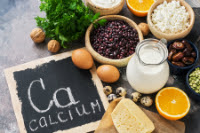
Calcium is the most abundant mineral in the human body and you might think that’s because of the essential role it plays in building strong bones; calcium’s importance, however, goes beyond preventing fractures and osteoporosis. It also supports healthy functioning of the cardiovascular, endocrine, and nervous systems. Numerous studies have established a relationship between calcium intake, absorption and assimilation and a person’s risk for heart disease, colorectal cancer, kidney stones, PMS, insomnia, and difficulty maintaining a healthy weight.
Eating a wide variety of whole foods is the best way to get the calcium your body needs for growth, maintenance, and repair. Even though dairy products contain and are fortified with calcium, foods derived from cow’s milk may not be the best choice for many people because of allergies, intolerance and other digestive concerns. Other valuable sources of calcium include almonds, dark leafy greens, legumes, and and nuts such as almonds. Be aware that just because you’re consuming the recommended amount of calcium daily does not mean your body is absorbing and utilizing it properly.
Recommendations for a calcium supplement vary by age, gender, and development (e.g., puberty, pre or post-menopause), and are influenced by health issues, lifestyle habits and taking certain prescription medicines. Different forms of calcium (e.g., carbonate, citrate) are absorbed differently by the body. Check with your San Diego Naturopathic Doctor to determine if you need a calcium supplement, and which form and amount is best for you.
References
Contact our office for more information
Journey of Health Medical Clinic
619-772-1164



 How are your cells doing today? Don’t know? Then a Nutrient Assessment might be in order.
How are your cells doing today? Don’t know? Then a Nutrient Assessment might be in order.


